Chain
For other uses, see Chain (disambiguation).
"🔗" redirects here. For other uses, see Link (disambiguation).

A broad metal chain made of torus-shaped links.
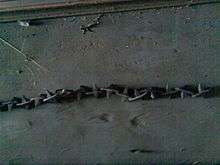
A metal chain with diamond-shaped link pins.
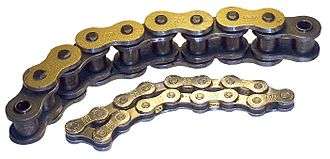
Roller chains.
A chain is a series of connected links which are typically made of metal. A chain may consist of two or more links.
- Those designed for lifting, such as when used with a hoist; for pulling; or for securing, such as with a bicycle lock, have links that are torus shaped, which make the chain flexible in two dimensions (The fixed third dimension being a chain's length.)
- Those designed for transferring power in machines have links designed to mesh with the teeth of the sprockets of the machine, and are flexible in only one dimension. They are known as roller chains, though there are also non-roller chains such as block chain.
Two distinct chains can be connected using a quick link which resembles a carabiner with a screw close rather than a latch.
Uses for chain
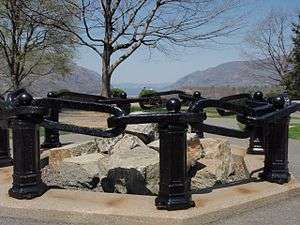
Part of The Hudson River Chain at West Point
Uses for chain include:
Decoration
- Chain of office, collar or heavy gold chain worn as insignia of office or a mark of fealty in medieval Europe and the United Kingdom
- Decorating clothing, some people wear wallets with chains connected to their belts, or pants decorated with chains
- Figaro chain, a decorative style of chain most often seen in men's jewelery
- Omega chain, a pseudo-chain where the 'links' are mounted on a backing rather than being interlinked
- Jewelry chain, many necklaces and bracelets are made out of small chains of gold and silver
Power transfer
- Bicycle chain, transfers power from the pedals to the drive-wheel of a bicycle, thus propelling it
- Chain drive, the main feature that differentiated the safety bicycle
- Chain gun, type of machine gun that is driven by an external power source, sometimes connected by a chain, to actuate the mechanism rather than using recoil
- Chain pumps, type of water pump where an endless chain has positioned on it circular discs
- Chainsaw, portable mechanical, motorized saw using a cutting chain to saw wood
- Flat chain, form of chain used chiefly in agricultural machinery
- Ladder chain, a light wire chain used with sprockets for low torque power transmission
- O-ring chain, a specialized type of roller chain
- Roller chain, the type of chain most commonly used for transmission of mechanical power on bicycles, motorcycles, and in industrial and agricultural machinery
- Timing chain, used to transfer rotational position from the crankshaft to the valve and ignition system on an internal combustion engine, typically with a 2:1 speed reduction.
Security and restraint
- Ball and chain, phrase that can refer to either the actual restraint device that was used to slow down prisoners, or a derogatory description of a person's significant other
- Bicycle lock (or "Bicycle Chain"), lockable chain
- Chain boom, large chains used to exclude warships from harbors and rivers
- Chain link fencing, fencing that utilizes vertical wires that are bent in a zig zag fashion and linked to each other
- Chain mail, a type of armor consisting of small metal rings linked together in a pattern to form a mesh.
- Door chain, a type of security chain on a door that makes it possible to open a door from the inside while still making it difficult for someone outside to force their way inside
- Leg iron chains (fetters), an alternative to handcuffs
- Security chain, chain with square edges to prevent cutting with bolt-cutters
Traction and pulling
- Anchor cable, as used by ships and boats, in British nautical usage it is a cable, not a chain
- Chain steam shipping
- Chain-linked Lewis, lifting device made from two curved steel legs
- Curb chain, used on curb bits when riding a horse
- High-tensile chain (or "Transport chain"), chain with a high tensile strength used for towing or securing loads
- Jack chain, a toothed chain used to move logs
- Lead shank (or "Stud chain"), used on horses that are misbehaving
- Pull switch, an electrical switch operated by a chain
- Rigid chain actuator, a type of chain that only bends in one direction, allowing it to operate under compression
- Snow chains, used to improve traction in snow
- Lavatory chain, the chain attached to the cistern of an old-fashioned W.C. in which the flushing power is obtained by a gravity feed from above-head height. Although cisterns no longer work like that, the phrase "pull the chain" is still encountered to mean "flush the toilet".
Weapons
- Chain gun, type of machine gun that is driven by an external power source, sometimes connected by a chain, to actuate the mechanism rather than using recoil
- Chain-shot, a type of ammunition for a cannon, used to inflict damage to the rigging of a sail vessel in naval warfare
- Chain weapon, a medieval weapon made of one or more weights attached to a handle with a chain
Other uses
- Chains can also be used as a percussion instrument for special effects, such as in Schönberg's Gurre-Lieder and Janáček's From the House of the Dead.
- Keychain, a small chain that connects a small item to a keyring
- Chain sinnet, a method of shortening a rope or other cable while in use or for storage
- Chain stitch, a sewing and embroidery technique
Invention
The metal link chain has been in use since at least 225 BC.[1]
Symbolism
The prevalent modern symbolism is oppression, due to the use for a mechanical restriction of the liberty of a human or animal.
Chains can also symbolize interconnectivity or interdependence. Unicode, in versions 6.x, contains the U+1F517 🔗 LINK SYMBOL, which may show chain link(s). It may denote a hyperlink.
Gallery
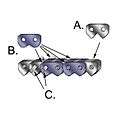 Silent chain
Silent chain Rope chain
Rope chain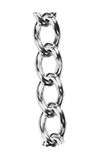 Twisted link chain
Twisted link chain Wheat chain
Wheat chain Single jack chain
Single jack chain Double jack chain
Double jack chain Stud link chain
Stud link chain Ladder link chain
Ladder link chain Foxtail chain
Foxtail chain Singapore chain
Singapore chain Rolo chain
Rolo chain
See also
References
- ↑ As early as 225 BC, chain was used to draw a bucket of water up from a well. This very early bucket chain was composed of connected metal rings.Tsubakimoto Chain Co., ed. (1997). The Complete Guide to Chain. Kogyo Chosaki Publishing Co., Ltd. p. 240. ISBN 0-9658932-0-0. p. 211. Retrieved 17 May 2006.
External links
| Wikimedia Commons has media related to Chains. |
 "Chain". Encyclopædia Britannica. 5 (11th ed.). 1911.
"Chain". Encyclopædia Britannica. 5 (11th ed.). 1911.
This article is issued from Wikipedia - version of the 10/26/2016. The text is available under the Creative Commons Attribution/Share Alike but additional terms may apply for the media files.